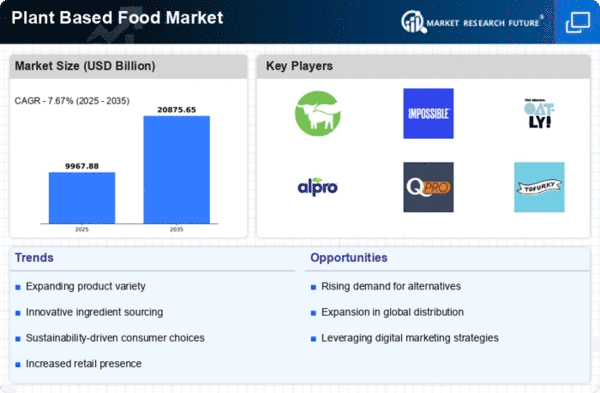Market Trends
Key Emerging Trends in the Plant Based Food Market
The market for plant-based food has expanded significantly in recent years due to customer desires for healthier and more environmentally friendly options. This emerging trend adds awareness of the environmental effects of conventional beast husbandry to the larger worldwide movement towards conscious living. One of the main factors propelling the sector is the rising consumer demand for plant-based food and dairy products, which is fueled by worries about the welfare of animals, the sustainability of the environment, and consumer health. Consumers are picking meals with less of an impact on the environment and in line with their principles with greater conscientiousness. In order to satisfy this rising demand, businesses in the plant-based food sector have been implementing and expanding their product immolations. The market has witnessed a growth of plant-based choices that closely replicate the flavor and texture of its beast- grounded equivalents, ranging from plant-based burgers and bangers to dairy-free milk and garbage demand. The concept of plant-based food is becoming popular not just at specialist and niche stores but increasingly in regular supermarkets and fast-food restaurants. Major participants in the food industry are responding to the need to adapt to shifting customer location by reducing the number of plant-based alternatives on their menus. This shift is being driven by the discovery that plant-based food might enhance health results, including decreasing cholesterol and the risk of certain illnesses, in addition to moral considerations. Furthermore, the industry for plant-based foods has seen a sharp increase in investment, indicating a high level of trust in its long-term survival. Large investors and adventure capital firms are also flooding plant-based entrepreneurs with cash, encouraging creativity and hastening the creation of new goods. This abundance of cash has not only helped established firms flourish but also opened doors for new ones, creating a competitive environment that offers customers an ever-widening range of options. It is impossible to overstate social media's impact on the development of plant-based food industry trends. Social media platforms like as Instagram and TikTok have emerged as crucial instruments for endorsing plant-based food, as influencers and celebrities showcase their plant-based food and fashion choices. The preconceptions around the alleged restrictions of plant-based foods have been dispelled in large part by this internet exposure, making them more approachable and endearing to a wider audience. The market for plant-based food is growing, but it still has obstacles to overcome. These include the need for constant product scalability, flavor and texture improvement, and resolving concerns about the nutritional acceptability of plant-based food. Nevertheless, persistent research and development efforts are assiduously tackling these problems, resulting in a constant improvement in the caliber and variety of products. Market Size A number of factors, including changing consumer preferences, growing health consciousness, and environmental measures, are driving up demand for food produced in factories. One of the primary drivers is the growing understanding of the health benefits of plant-based food. There is a discernible shift in favor of plant-based dairy products as people learn more about the relationship between making good choices and overall wellbeing. The demand for healthful and nourishing solutions is driving this trend. Another significant element affecting the plant-based food industry is environmental sustainability. Due to increased knowledge of climate change and the detrimental environmental impacts of conventional livestock husbandry, consumers are searching for more sustainable solutions. People who are concerned about the environment will find plant-based food to be an enticing alternative because it frequently requires less land, water, and energy to produce. They also typically have a reduced carbon footprint. The industry for plant-based food is growing as sustainability emerges as a critical issue in forming attitudes. The market for plant-based food is expanding in tandem with the emergence of flexitarianism. A flexitarian diet is a flexible approach to plant-based eating, in which individuals occasionally consume beast products and include additional plant-based alternatives into their lifestyle. This change in healthy behaviors allows consumers to cut back on their intake of meat without completely eliminating it. It also reflects a larger movement towards moderation and balance. The industry for plant-based food responds to this changing customer trend by providing a range of mouthwatering and easily available plant-based foods something flexitarians find appealing. A key market aspect is the rise in investment and innovation in the food industry, in addition to shifting customer tastes. Both established food businesses and start-ups are investing in research and development to create cutting-edge plant-based food that closely resemble the flavor, texture, and nutritional makeup of conventional beast-ground meals. The industry is expanding due to the increased variety and quality of plant-based products, which draw in both insectivores and those interested in exploring healthier and sustainable alternatives. The market for plant-based food sourced from factories is also being impacted by government initiatives and rules. In certain areas, initiatives to support diets centered around factory farms are being enforced as part of larger health and environmental agendas. This includes actions like to identifying circumstances, public consciousness campaigns, and subsidies for plant-based husbandry. Government assistance may create an environment that is favourable for the plant-based food industry to flourish in, enticing more customers to convert to plant-based products. The accessibility and cost-effectiveness of plant-based goods are important factors propelling the expansion of the industry. The cost of plant-based demand is expected to decrease as product ramps up and technology progresses, making them more competitive with conventional plant-based food. The market reach is further expanded by increased availability through mainstream stores and widespread availability in caffs and foodservice locations, making plant-based products a viable and accessible option for a wider customer base.


















Leave a Comment